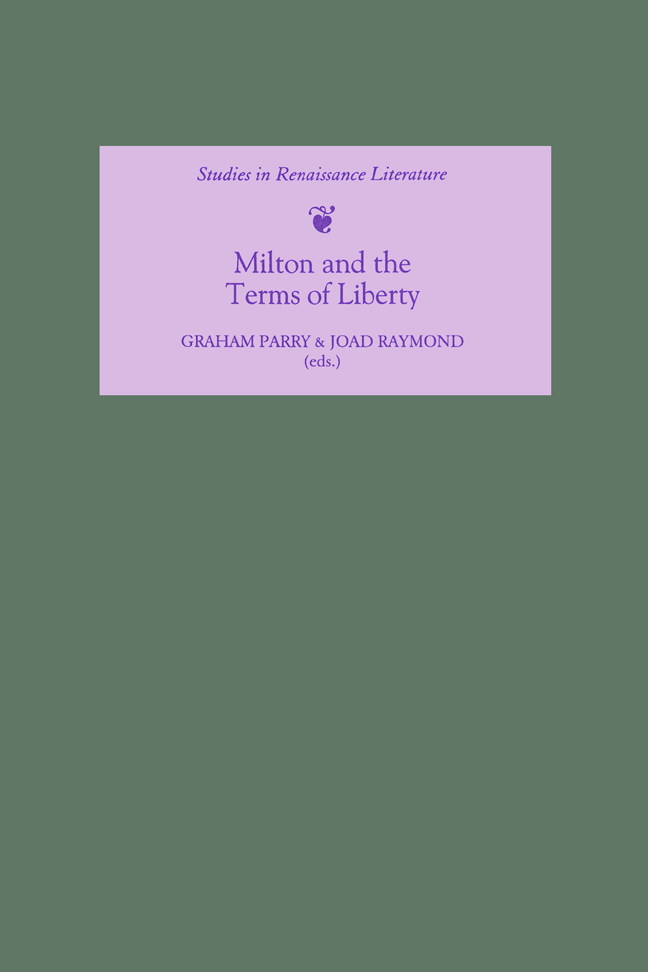Book contents
- Frontmatter
- Contents
- Contributors
- Acknowledgements
- Introduction
- 1 John Milton and the Politics of Slavery
- 2 Milton before ‘Lycidas'
- 3 Prosody and Liberty in Milton and Marvell
- 4 'In These Western Parts of the Empire': Milton and Roman Law
- 5 The King is a Thing
- 6 'in time of Warre … our Language is all corrupt with military Tearms': The Politics of Martial Metaphors in Post-regicide England
- 7 Alexander More Reads Milton: Self-representation and Anxiety in Milton's Defences
- 8 Stylometry and the Provenance of De doctrina christiana
- 9 The Figure and the Ground: Samson as a Hero of London Nonconformity, 1662-1667
- 10 The Publication of the King's Privacy: Paradise Regained and Of True Religion in Restoration England
- 11 'To try, and teach the erring Soul': Milton's Last Seven Years
- 12 Pandemonic Panoramas: Surveying Milton's ‘vain empires’ in the Long Eighteenth Century
- Index
- Studies in Renaissance Literature
10 - The Publication of the King's Privacy: Paradise Regained and Of True Religion in Restoration England
Published online by Cambridge University Press: 15 February 2024
- Frontmatter
- Contents
- Contributors
- Acknowledgements
- Introduction
- 1 John Milton and the Politics of Slavery
- 2 Milton before ‘Lycidas'
- 3 Prosody and Liberty in Milton and Marvell
- 4 'In These Western Parts of the Empire': Milton and Roman Law
- 5 The King is a Thing
- 6 'in time of Warre … our Language is all corrupt with military Tearms': The Politics of Martial Metaphors in Post-regicide England
- 7 Alexander More Reads Milton: Self-representation and Anxiety in Milton's Defences
- 8 Stylometry and the Provenance of De doctrina christiana
- 9 The Figure and the Ground: Samson as a Hero of London Nonconformity, 1662-1667
- 10 The Publication of the King's Privacy: Paradise Regained and Of True Religion in Restoration England
- 11 'To try, and teach the erring Soul': Milton's Last Seven Years
- 12 Pandemonic Panoramas: Surveying Milton's ‘vain empires’ in the Long Eighteenth Century
- Index
- Studies in Renaissance Literature
Summary
Paradise Regained and Samson Agonistes, which were published together in 1671, are deceptively nonpolitical poems. Their texts conceal the historical traces of their own composition so skilfully that readers are likely to forget their political significance. However, unlike Samson Agonistes, which has escaped any conclusive argument over the date of its composition, Paradise Regained has failed to dehistoricise itself because Thomas Ellwood and Edward Philips independently bear contemporary witness on its composition after the publication of Paradise Lost in 1667. While Paradise Lost was evidently composed over the long period before and after the Restoration, Paradise Regained was written in the last several years of the 1660s that saw new political problems in post-revolutionary society. Among Milton's three major poems, the brief epic thus addressed itself most specifically to the Restoration audience. Although Paradise Regained historically shares much with Milton's other major poems, the purpose of this paper is to historicise Paradise Regained as a Restoration poem in order to propose a new political way of reading the brief epic.
The historical orientation of Paradise Regained in the political context of Restoration society requires a juxtaposition of the brief epic not so much with Milton's political pamphlets before the Restoration, like Eikonoklastes (1649) or The Readie and Easie Way (1660), as with his only political treatise after the Restoration, Of True Religion (1673). Paradise Regained is historically in closer proximity to Of True Religion than to any other polemical piece of the author. With all their generic differences, the two works, sharing the plain style peculiar to the Restoration Milton, were published in a crucial period before and after the Declaration of Indulgence in 1672, when Restoration society was groping for a new direction after the lapse of the Clarendon Code which had imposed public regulations on the matter of private faith. Both Paradise Regained and Of True Religion appeared when Milton's contempor- aries were eager to settle the developing issue of the relationship between the public and private spheres in Restoration society.
Paradise Regained is concerned with how to show Christ's private life to the Restoration audience. It is suggestive at first to reconsider why Milton chose the episode of the temptation in the wilderness when he wrote a poem on the life of Jesus Christ as a sequence of Paradise Lost.
- Type
- Chapter
- Information
- Milton and the Terms of Liberty , pp. 163 - 174Publisher: Boydell & BrewerPrint publication year: 2002

